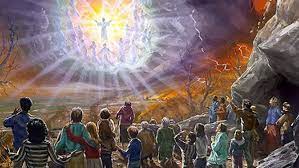Ee – Bibliography
Bibliography

Baker, Kenneth: General Editor, The NIV Study Bible, Grand Rapids, Zondervan, 2011.
Barclay, William, The Letters to the Corinthians, Philadelphia, Westminster Press, 1956.
Bertolini, Dewey and Richards, Larry, The Book of First Corinthians: The Smart Guide to the Bible. Nashville, Thomas Nelson, 2007.
bible.org
Boettner, Loraine. Roman Catholicism. Phillipsburg: The Presbyterian and Reformed Publishing Company, 1962.
Chafin, Kenneth, Preachers Commentary: First and Second Corinthians, Nashville, Thomas Nelson, 1985.
Coleman, Lyman, Serendipity Bible for Groups, New International Version, Serendipity House, Littleton, Colorado, 1988.
Currid, John. Exodus, Volume 2, Auburn, Evangelical Press, 2001.
Elliott, Elizabeth. Discipline, the Glad Surrender, Old Tappan, Revell Books, 1982.
Erickson, Millard. Christian Theology, Grand Rapids, Baker Book House, 1985.
Fee, Gordon, First Epistle to the Corinthians, NICNT, Grand Rapids, Eerdmans, 2014.
Fee, Gordon and Stuart, Douglas, How to Read the Bible for All Its Worth. Grand Rapids, Zondervan, 1982.
Fisher, John, The Epistles from a Jewish Perspective, Clarksville, Messianic Jewish Publishers, #74268
Freeman, James, Manners and Customs of the Bible. Plainfield, Logos International, 1972.
Fruchtenbaum, Arnold, The Footsteps of the Messiah, Tustin, Ariel Ministries, 2004.
Fruchtenbaum, Arnold, act105.mp3.
Garland, David E, First Corinthians, Grand Rapids, Baker Commentary on the NT, 2003.
Godet, F. L.,The First Epistle to the Corinthians, Grand Rapids, Zondervan, 1886.
Grosheide, F. W., The First Epistle to the Corinthians, Volume 1, The New International Commentary on the New Testament, Grand Rapids, Eerdmans Publishing Company, 1957.
Grosheide, F. W., The First Epistle to the Corinthians, Volume 2, The New International Commentary on the New Testament, Grand Rapids, Publishing Company, Eerdmans, 1957.
Guzik, David, Verse by Verse Commentary on Acts, Simi Valley, Enduring Word, 2000.
Hinnebusch, Paul, Community in the Lord, Notre Dame, Ave Maria Press, 1975.
Hislop, Alexander, The Two Babylons, Loizeaux, Neptune, 1959.
Hodge, Charles, An Exposition of the First Epistle to the Corinthians, Grand Rapids, Eerdmans, 1974.
Kasdan, Barney,The Jewish Context of the Book of Romans.mp3, by Rabbi Barney Kasdan, San Diego, Kehilat Ariel Messianic Synagogue, 2018.
Lenski, R. C. H. The Interpretation of St. Paul’s First and Second Epistles to the Corinthians, Minneapolis, Augsburg Publishing House, 1963.
Lucado, Max, Life Lessons from First Corinthians, Nashville, Thomas Nelson, 2018.
MacArthur, John. First Corinthians, Chicago, The Moody Bible Institute, 1984.
Marshall, I. Howard, Acts, TNTC, Grand Rapids, Eerdmans, 1996.
McGee, J. K, First Corinthians for the Practical Messianic, Richardson, Messianic Apologetics, a division of Outreach Isra’el Ministries, 1995.
McGee, J. Vernon, First Corinthians. Nashville, Thomas Nelson, 1991.
Morgan, G. Campbell, The Corinthian Letters of Paul, An Exposition of I and II Corinthians. Eugene, WPIF & Stock, 1946.
Morris, Leon, First Corinthians, Tyndale New Testament Commentaries, Downers Grove, Inter-Varsity Press, 1985.
Pliny the Younger, Epistulae.
Pratt, Richard, First and Second Corinthians, Nashville, Holman NT Commentary, 2000.
Stern, David, Jewish New Testament Commentary. Clarksville, Jewish New Testament Publications, 1992.
www.relevantbibleteaching.com
Rubin, Barry, The Complete Jewish Study Bible, Clarksville, Messianic Jewish Publishers, 2016.
Verbrugge, Verlyn, The Expositors Bible Commentary: Volume 11: Romans – Galatians, Grand Rapids, Zondervan, 2008.
Walvoord, John and Zuck, Roy. The Bible Knowledge Commentary of the Old Testament. Wheaton, Victor Books, 1985.
Wiersbe, Warren, First Corinthians: Be Wise, David C. Cook, Colorado Springs, 1977.





















